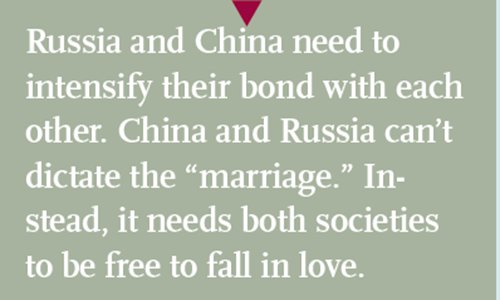Commentaries
Your Present Location: Teacher_Home> Wang Wen> CommentariesChina and Russia seek further cooperation in finance, education and culture
By Wang Wen Source: Global Times Published: 2019-6-12
○ Tourists visiting Russia, with Chinese tourists spending much more than US and European counterparts
○ Experts believe potential for partnership is largely untapped, and efforts should be made from grassroots level to strengthen ties.
○ Russian scholars believe that the China-Russia relationship serves as a model for major-country relations.

A Chinese worker checks Russian national flags to be exported to Russia for the 2018 FIFA World Cup at a factory of World Cup themed products manufacturer in Yiwu, East China's Zhejiang Province, on June 26 2018. Photo: IC
Russia should fall in love with China more times, Alexander Ageev, Director General at the Institute for Economic Strategies in Russia, said at a round table conference on the greater Eurasian partnership and the Belt and Road Initiative held in early June.
At the 6th China-Russia economic think tank dialogue and the 4th Russia-China business forum, many Russians held an active attitude toward enhancing cooperation with China and benefit from China's Belt and Road Initiative. Sergey Glazyev, the Russian President's economic counselor, commented that in order to develop China-Russia relations to a comprehensive strategic partnership of coordination for a new era, the two major countries bear the responsibilities to preserve human civilization and keep peace.
Chinese presence
Visitors arriving at Moscow will see signs and notices at the airport all written in Russian, English and Chinese. Slogans such as "Russia welcomes you" are written in Chinese and placed at money exchange booths and transfer desks, bringing a cordial feeling to Chinese people arriving in the country.
"It is because China is the top source country of foreign tourists to Russia," said Arkhipova Violetta, Senior Researcher of Institute of Economics RAS, PhD, at the Russian Academy of Sciences. He noted, "more than one million trips to Russia have been made by Chinese for consecutive years. Chinese account for one-third of Russia's total foreign visitors. Russia should of course prepare well and offer good services to welcome Chinese."
Chinese visitors can be seen everywhere at Moscow's Red Square and Nevsky Prospect of St. Petersburg. In addition, what makes Chinese people stand out are their purchasing power - they usually spend twice as much as visitors from the US and Europe.
The tourism department of Russia has also come up with methods to attract more Chinese visitors. They designed the "Red Tourism route" specifically for Chinese and provided convenient services for Chinese football fans who came to watch the 2018 FIFA World Cup in Russia.
With the number of Chinese tourists to the country growing, Chinese has become a popular foreign language for Russians to learn. For the first time, Russia plans to include a Chinese language test this year in the national college entrance exam.
He Fang, the Chinese director of the Confucius Institute at St.Petersburg State University, told the Global Times, "Hundreds of Russian graduates are expected to apply for the test. Because of limited seats, registration needs to be screened first."
Chen Zhigang, an overseas Chinese in St. Petersburg who has been living in Russia for nearly 30 years, has run the Russian-Chinese Business Park in St. Petersburg since 2012. "Thanks to the warming of China-Russia relations, the Park received more than 200 delegations from China every year, and the Chinese restaurant was full almost every day," he said.

Insufficient capital
During the China-Russia economic forum, a sub-forum of the St Petersburg International Economic Forum, was held on June 3 and 4. The China culture center at the Business Park also held a photo and art exhibition marking the 70th anniversary of China-Russia diplomatic relations, drawing more than 600 people from all walks of life.
Russians' feelings towards China are mixed, according to local research institutions. On the one hand, an increasing number of Russians believe that "China is a friendly country" and "China's development is more successful than that of Russia." On the other hand, voices that complain "China threatens Russia's interests in the Far East region" can also be heard.
The theme of the round table conference was "integration of the greater Eurasian partnership and the Belt and Road Initiative". In the view of Alexander Ageev, Russia and China need to intensify their bond with each other. China and Russia can't dictate the "marriage." Instead, it needs both societies to be free to fall in love, he joked.
In the view of Russian scholars, the development of Russia-China relations should not only be pushed forward by the leaders of the two countries, but more from in-depth people-to-people exchanges in various fields.
Kirill Dmitriev, CEO of the Russian Direct Investment Fund (RDIF), has made it his main goal to meet the requirements of China-Russia investment cooperation highlighted by Russian President Vladimir Putin.
He said that RDIF is actively promoting alignment with BRI, and aims to develop the Eurasian regional economic partnership mechanism and promote the economic development of the countries involved.
Cooperation is not limited in infrastructure. The deepening of cooperation reflects the unprecedented interaction and high-quality cooperation between Moscow and Beijing, Kirill explained.
Andrey Kostin, president of VTB Bank, said that Russia will not replace Western investment with Chinese investment, but wants to cooperate with both. Nevertheless, as the impact of US sanctions on Russia's economy deepens, many Russians have come to see China as a natural partner.
Connecting BRI with the Eurasian Economic Union (EEU) is an important task for Russia today, according to Andrei Spartak, Chairman of committee of economic integration and the foreign economical affair. He also chairs Chamber of Commerce and Industry of the Russian Federation.
Although the relevant agreements do not currently cover the issue of market access, two sides have formulated many provisions to open up each other's markets, he believes.
Andrei Spartak regards Russia as a big country with insufficient funds. Cooperation between China and Russia helps attract foreign investment to increase exports and promote investment and economic growth.
Some Russian scholars said at the conference that the relationship between China and Russia has become a model for major-country relations. However, the potential for cooperation between the two countries in trade, finance, culture and other fields is still far from being realized.
For example, the trade volume between China and Russia exceeded $100 billion in 2018, marking an increase of 30 percent from 2017.
However, this represents only one third of the trade volume between China and Japan and between China and South Korea, and less than one fifth of the trade volume between China and US and between China and EU.
Russia's relatively single trade structure is one of the reasons behind this. In fact, there are broad prospects for cooperation in agriculture, science and technology, transportation and services between China and Russia.

Suggestions for cooperation
Think tanks in China and Russia have also made corresponding efforts to promote cooperation between the two countries in various fields.
The Chongyang Institute for Financial Studies, Renmin University of China and the team of Sergey Glazyev formed a research group and published a joint report entitled "Questions and Situations on the Conjugation of EEU and BRI between China and Russia" in St. Petersburg.
In addition to stressing the importance of EEU and BRI and identifying the achievements and potential for bilateral cooperation, the report highlights the obstacles in cognitive and institutional differences between China and Russia.
For example, China-Russia financial cooperation lacks institutional guarantees and its potential has not been developed.
From the perspective of Sergey Glazyev, Chinese investment in Russia is small, both in terms of stock and flow.
In 2016, the investment flow of Chinese banks in Russia was only $1.29 billion, and investment stock was $12.98 billion, accounting for 0.657 percent of China's overseas investment flow and 0.956 percent of investment stock. China was not even in the top 10 countries and regions investing in Russia.
After the Ukraine crisis, Western economic sanctions increased the vulnerability of Russian financial system and seriously dampened the enthusiasm of Chinese financial institutions for cooperation.
Although the two countries' banks exchanged local currency business and encouraged settlements in local currency, enterprises of the two countries are more inclined to choose third-party financial institutions or currencies for settlement in order to avoid risks, as the Russian financial system is relatively fragile and the exchange rate of the ruble fluctuates greatly.
At present, the US dollar is still extensively used by both sides. This not only lengthens the period of settlement, but also increases costs.
Experts from China and Russia have made many suggestions: trade between the two governments and state-owned enterprises should be settled in local currency; the docking of the payment system of state-owned banks, and supporting the direct participation of state-owned banks in inter-bank information exchange; the docking of UnionPay and Mir systems between two countries and so on.
Zhou Li, former vice minister of the International Department of the Central Committee of the CPC and head of the delegation to Russia this time, believes that China and Russia need to improve guarantees in investment and financing, strengthen the overall assessment of the risks brought by US sanctions and long-arm jurisdiction to the cooperation. It needs to explore non-dollar settlement channels in the field of energy trade, which is relatively easy to achieve.
For cooperation in some sensitive areas, China and Russia should aim to get rid of the long-standing US dollar hegemony on bilateral financial and investment cooperation, and push for the expansion of currency swaps and settlement.
The author is executive dean of Chongyang Institute for Financial Studies at Renmin University of China.























































































 京公网安备 11010802037854号
京公网安备 11010802037854号





